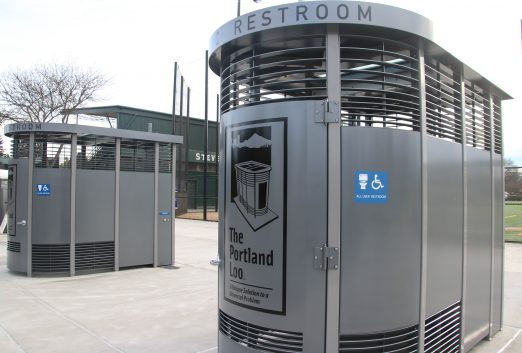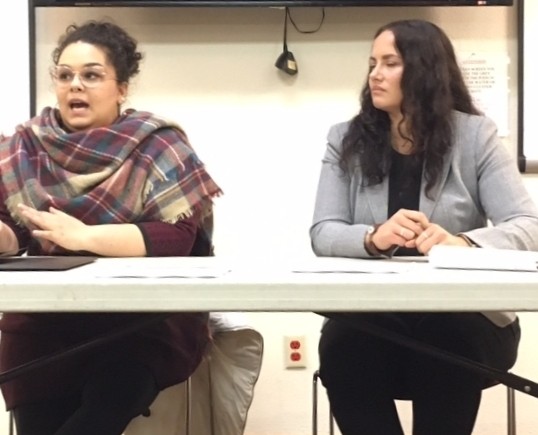From LEAD to loos at North Highline Unincorporated Area Council
By Tracy Record
White Center Now editor
The North Highline Unincorporated Area Council‘s meetings usually yield a wealth of information.
Often it’s not even related to topics on the agenda. For example:
Those are the two “Portland Loo“ public toilets recently installed at Steve Cox Memorial Park. They were mentioned by King County Sheriff’s Office Deputy Bill Kennamer. Two more are on the way.
Now, the main topic:
LEAD: The meeting began with a discussion of Law Enforcement Assisted Diversion (LEAD), which will start soon in White Center. LEAD addresses “low-level crimes” committed by people who have challenges such as behavioral health, substance abuse, extreme poverty, as explained by the two Public Defender Association reps who spoke, Melodie Reece and Tiarra Dearbone, as well as KCSO Major Jesse Anderson.
It’s been available in Burien and Seattle, “and it only makes sense to close that gap” and have it be available in North Highline, too, said Maj. Anderson. “The bottom line is, we want people to turn their lives around. … It’s a great tool, like many other resources we bring in.” The collaboration with defense lawyers is with “a common goal in mind,” he added. The defense reps offered a history – it started in Seattle’s Belltown neighborhood almost a decade ago, in response to the disparity of policing with offenders of color. This has become a national/worldwide model, said Reece. “LEAD is a good way for jurisdictions to try on a new approach.” This can cut recidivism by “up to 60 percent for each individual,” she said, and it “free(s) up police and prosecutors to deal with bigger cases.”
Dearbone explained that it’s a very “individualized” program, jurisdiction by jurisdiction. To make a diversion, first law enforcement will check eligibility, then hand off the client to a case manager. PDA meets twice monthly with law enforcers and talk about specific cases.”It’s a lot more eyes on the individual,” she said. Ultimately, if the person is making progress, prosecutors can opt not to charge them. There’s also a “social contact referral” that law enforcers can point them to – “it doesn’t have to be on arrest for these people.” Case managers would go out looking for the particular person; law enforcers know these people so well, they can often suggest where to find them. “The objective is …. a crime reduction program,” decreasing “their involvement in these law violations.”
What if a client is homeless? asked NHUAC president Barbara Dobkin. If they’d like to be housed, Reece said, they work with them – but often that’s not their first priority. Housing is pretty scarce right now, she added. What’s the capacity of the program? an attendee asked. Optimally, 20-25 clients per case manager, but it’s “well above that” in Seattle right now, said Reece. They’re also deciding who will be WC’s service provider. Right now in Burien, added Dearbone, they have 16 active cases.
Public money plus private donations fund the program, Reece said in response to another question.
When is it starting in White Center? “Pretty soon,” replied Reece, but they have to find a service provider for the case-management work via an RFP process. Dearbone said they’ve used REACH in Seattle and Burien but want local decisions on that.
How long do they follow people? “As long as they need,” said Reece.
When do they decide if it isn’t working? It’s up to prosecutors to decide whether to charge someone or not.
Currently they have almost 800 clients in Seattle. LEAD costs “significantly” less than the criminal-justice system’s regular process, said Dearbone. Maj. Anderson said not only are they helping the person, but likely preventing further crimes. Reece said businesses and individuals can make “social contact referrals” too. The people involved in LEAD are suspected of very low-level crimes and also have to NOT have a “significant criminal history,” they said.
What about emphasizing a specific problematic area, like downtown near the County Courthouse? asked Dobkin. Seattle Police have a lot of emphasis in the Pioneer Square area, said Reece, but many of the problem people there are not LEAD clients. “It’s a really tough location. … being close to that area, we really feel it too.” But, “we’re only one piece of the service-provision puzzle.” Dearbone added, “There’s still a need for” other programs, beyond their scope, which is crime reduction. Maj. Anderson said everyone in KCSO in this area should be trained in January, February, and then they’ll make decisions in the field.
How is it working so far in Burien? Well, they said. Dearbone gave an example of an emphasis involving the Burien Safeway, and they diverted a couple people who were breaking the law just to avoid going hungry.
“We gotta do something, because what we’re doing now isn’t working,” said Deputy Bill Kennamer. He can arrest somebody, take them to jail, but that person may be put back out on the street without even spending the night in jail.
Case managers have the right to professionally care about people who need someone to care about them, Reece observed.
Got questions? Contact the PDA..There was talk of bringing the reps back in six months or so for an update.
CRIME UPDATE: Deputy Kennamer’s title is now Community Crime Prevention Deputy. Of November, “a particularly rough month for violent crime. We have a crew running around people like crazy – violent takeover robberies.” But “that crew is being worked on.”
There’s a new hookah lounge at 1st/108th, site of a drive-by shooting last month, he noted. Bartell Drugs in WC was robbed on November 5th, a pharmacy holdup. He also listed a variety of cases involving guns, one with a suspect as young as 14. Part 1 – major – crimes are up “quite a bit”; vehicle thefts are “through the roof.” Not clustered anywhere – it’s all over the “unincorporated lowlands.”
Robberies at marijuana stores were a topic for a while; Crime Prevention Through Environmental Design could help, said Kennamer.
“Positives” – a nuisance house in Myers Way has been addressed; then he mentioned the new Portland Loos, noted above. He also had warm words for the Department of Local Services cleanup program (showcased earlier in the week). A Top Hat problem property has some changes on the way.
NOXIOUS WEED PROGRAM: Marta Olson from the county talked about the Healthy Lands Project, which is “focused on going into new conservation lands …that usually have a high weed burden” and need some initial attention to clean up before they can be used as parks/open space. The program’s had a big focus on urban areas andd has a “lot of funding available to acquire lands or easements on lands.” That means grant opportunities, or even identifying future parks. The main focus of her appearance: Seola Pond, “a really beloved informal park.” DIRT Corps has been paid to clean out blackberries, grants have gone to community leader and pond steward Scott Dolfay, and as previously announced, a big volunteer effort was planned this past Saturday.
P.S. Looking for info on noxious weeds? kingcounty.gov/weeds
FIREWORKS FOLLOWUP: Councilmember Joe McDermott was reported to have told a constituent the council will take up a proposed ban in January. Right now, passing a ban would stll mean it doesn’t take effect for a year. Local legislator Joe Fitzgibbon said the Legislature could take up something to waive that waiting period. But it needs community support. A discussion ensued – “every year it seems to get worse an worse and louder,” observed Dobkin, suggesting a vote on whether NHUAC should formally support the proposed ban. The motion passed.
COMMUNITY ANNOUNCEMENTS: White Center Kiwanis is selling cans of mixed nuts for $20 …The baked potato/taco bar dinner with New Start High School is January 16th, 5:30-7 pm in the gym, at the school (on SW 120th).
RIP, DEPUTY COX … The 13th anniversary of Deputy Steve Cox‘s murder was Monday. He was NHUAC president as well as deputy. “He will always, always be missed,” Dobkin said. Deputy Kennamer said Deputy Cox’s son is 16 years now and active in sports.
NO JANUARY NHUAC MEETING … since the first Thursday is the day after New Year’s Day.
You can follow any responses to this entry through the RSS 2.0 feed. Both comments and pings are currently closed.



December 22nd, 2019 at 2:03 pm
LEAD was once also available in Skyway during its initial pilot in King County. Its success in that pilot is the reason the program has been expanded since.
But King County hasn’t chosen to fund LEAD in Skyway any longer. What’s up with that?